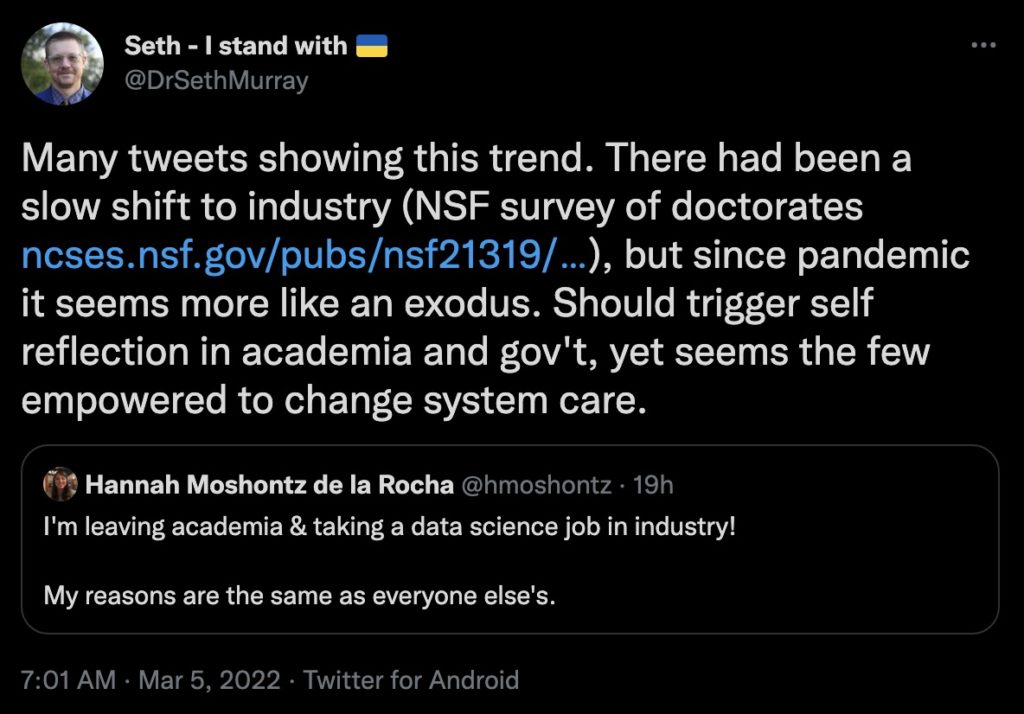Inspired by this tweet, which I started to answer and then realized my thoughts were longer and more complicated than could fit in a couple of tweets of my own.

My anecdotal observations have been the same as Seth’s. More and more high performing researchers in the public sector on leaving. Some for jobs in industry. Some for completely different positions. Some people are leaving tenured positions with no plan about what they want to do next. I could write about my ideas about why this is happening for a lot of paragraphs. But that’s not what I’m writing about today. Instead I want to think out loud about the question: Why aren’t decision makers worried about this trend? I think a big part of the explanation is that a lot of public sector researchers and administrators are motivated by zero sum incentives.
If the USDA has enough funding to support 20 research grants in a particular area this year, if I submit a grant proposal and the USDA decided to fund it, it reduces the odds that someone else working down the hallway or at the ag school in the next state over will also have their proposal funded. At the administrator level, a key metric everyone always seems to be talking about is total grant expenditures. Almost has a plan or roadmap to increase total external research funding by fifty percent, or eighty percent, or even double it in the next five or ten years. Federal funding for research doesn’t increase that fast, so every school’s plan is essentially to out compete other schools for the same fixed pot of money.
In the days of printed scientific journals, the same explicitly zero sum logic applied to publishing papers in prestigious journals. Each volume of the journal could only be so thick so if my buddy over at New England A&M’s paper got accepted at the Journal of Highly Impactful Research, that meant there was less room for the same journal to accept my paper. Today with most journals online the idea of hard limits doesn’t apply in the same way that it used to, but there is still a rough sense that the editors of a journal probably have a rough sense of how many article they want to put out each year, and if they’re seeing fewer than that they’ll accept papers that are modestly less significant advances, and if they’re seeing a lot of papers, they’ll raise their standards for how impactful they think a paper is likely to be before they send it out for review.
Looked at this perspective, having other scientists leave the field is, if anything, good for individual researchers in the public sector. More resources to go around. From an administrator’s perspective, researchers leaving other schools is clearly good. But having your own scientists leave is obviously a problem if you’re going to stay on track to double total research expenditures in cough-mumble-something years. Fortunately there is an easy solution at hand if you’re an administrator who just lost your star researchers who left to be a research director at a big private company, launch a startup, or take an early retirement on a lake in Minnesota where his only access to the internet is at a cafe in town that he stops by occasionally for their famous cinnamon rolls and to post on twitter about how much happier he is since he left academia. … okay that last example got away from me. But in any case, if you’re an administrator and you’ve lost that star researcher who was bringing in millions in research funding, your course is clear: authorize a search to refill the position. After all, everyone knows there are more PhDs being trained than there are faculty positions to hire them when they graduate. And the loss of your high performing researcher means you have the money to fund a new position. Because the academia salary pool in another zero sum game.
But here is the big problem: while internally scientists and research administrators are engaged in a grueling and zero sum fight for funding and papers and prestige, externally the whole reason we — public sector scientists — exist is to get things done. Specifically two things: 1) advance scientific understanding in ways that will ultimately benefit the society that pays us and funds our efforts and 2) train a new generation of scientists who will know more than we do, have different and better skills than we do, and who will go on to accomplish bigger and better things in both the public and private sectors.
And, unlike grants and papers, those things aren’t zero sum. As fewer and fewer talented and motivated young people choose against to pursuing scientific research as a career… As more and more skilled, hard working and successful scientists are abandoning tenured positions at major research universities… Well we may end up with the same number of scientists, whose research is funded with the same number of dollars, and who publish the same number of papers in the same journals. But we’ll be learning fewer new things. And the new scientists we are training will be less capable and have fewer of the skills they need to succeed when they graduate and arrive at their new jobs in the public and private sectors.
What we do or don’t do. What scientific research does accomplish or doesn’t accomplish. It matters. It matters to the overall society and civilization that chooses to support a bunch of scientists to run around poking at things, and analyzing data, and testing new ideas.
And the less attractive we make that job, the fewer talented and motivated and driven and skilled people we’re going to attract to the field, and the fewer benefits we’re going to provide back to the people who elect the governments that support us.